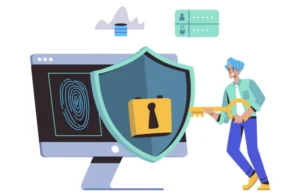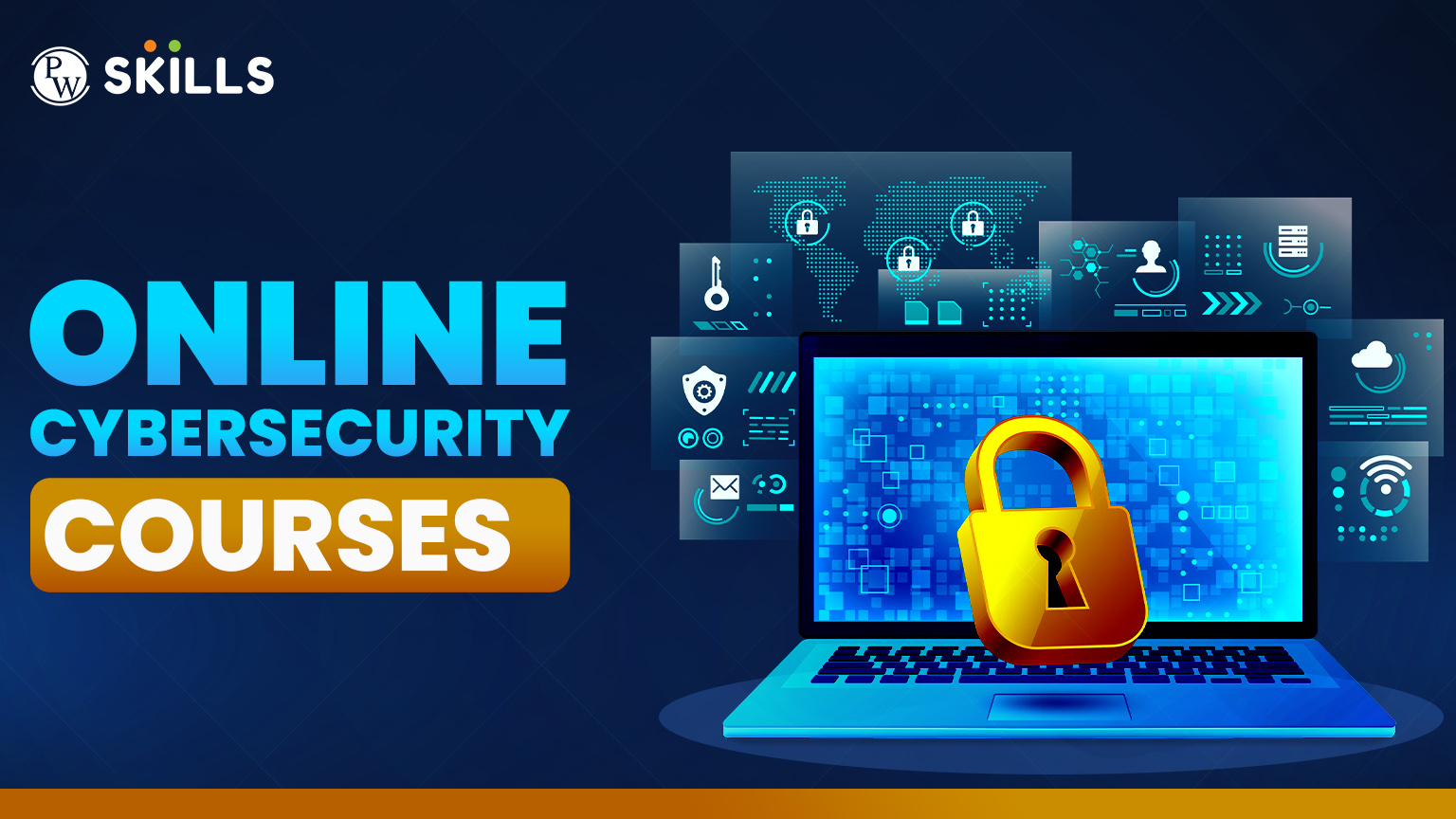In todays modern tech world cybersecurity protects your personal data, corporate secrets, and even national security. Cybersecurity learning courses could be one of the biggest investments advisable for any smart career in 2025.
There is a course in online cybersecurity for you-whether you are a college student concerned with ethical hacking or a working professional seeking a role that could draw high pay in security. The beauty is that learning can now be done anywhere, at your own pace, without leaving the job you are currently doing or studies.
Let’s dive in more to explore.

Why Cybersecurity Courses Will Be in High Demand in 2025
Technology has given comfort in life, but it has also thrown the door wide open for threats. Every click, every transaction online, and every stored password is a potential target. No business can afford any breach in security, and that is why they all employ experts trained through cybersecurity courses of the highest standards.
- Global Talent Shortage: Millions of cybersecurity roles are vacant across the globe.
- High Salary: Certified professionals earn 2–3x more than non-certified peers.
- Remote Work Types: There are many roles that are location-independent.
- Diverse Career Paths: Ethical hacking to cloud security – it has something for everyone.
- Beginner vs. Advanced Cybersecurity Courses
Not every cybersecurity course is the same; here is how to differentiate:
For freshers:
- Entrance level Cybersecurity Courses endorsement for beginners without pre-requisites.
- Focus on basic networking courses, malware awareness, and detection/security tools.
- Ex.: Google Cybersecurity Professional Certificate, Cisco Networking Academy Introduction to Cybersecurity.
For advanced ones:
- Courses focused on ethical hacking, penetration testing, or cloud security.
- Expect more hands-on labs, certifications, and complex case studies.
- Ex.: OSCP, CEH, MIT xPro Cybersecurity Program.

Beginner vs. Advanced Cybersecurity Courses – What’s the Difference?
| Feature | Beginner Cybersecurity Courses | Advanced Cybersecurity Courses |
| Prerequisites | None or basic computer skills | Networking, scripting, IT experience |
| Focus Areas | Cyber hygiene, basic threats, intro to tools | Ethical hacking, penetration testing, cloud security |
| Learning Style | Guided tutorials, quizzes, and basics | Hands-on labs, real-world case studies |
| Certifications | Entry-level certificates | Industry-leading certifications (CEH, OSCP) |
| Career Impact | Prepares you for internships or junior roles | Qualifies you for specialist and leadership positions |
Top 12 Online Cybersecurity Courses for 2025
-
Professional Cybersecurity Certification by Google (Coursera)
A few beginner-friendly courses include practical projects and real-world case studies. Google is confident it can make you an industry-ready professional with its SIEM and Python for automation skills.
Why Should One Choose It?
- Self-Paced Learning
- Projects for Job Readiness
- Recognized Google Certification
-
Cybersecurity Specialization – University of Maryland (Coursera)
Cryptography, usable security, and secure software design come under the rubric of study for one of the best courses in cybersecurity for people with a strong academic foundation.
Why choose it:
- Academic credibility
- Both theory and application
- Great for students aiming for master’s or Ph.D. later.
-
Certified Ethical Hacker (CEH)- EC-Council
This is perhaps the best course because it teaches you how to think like a hacker in order to defend against them better. You are likely to have exposure to more than 20 hacking domains, from system penetration to IoT vulnerabilities.
Reasons for choosing it:
- Globally recognized certification
- Practical hacking labs
- High employability in security testing roles
-
PW Skills Cybersecurity Course
A practical and project-based cybersecurity course suitable for students and working professionals. The students will be putting up live cyberattacks and learning how to counter them.
Why choose it:
- Live mentor sessions
- Career guidance and resume building
- Affordable pricing
-
IBM Cybersecurity Analyst Professional Certificate
Covering network defense, incident response, and security compliance, this course stands as one of the premier security courses available for building a highly credible industry portfolio.
Why choose it:
- Practical case studies
- IBM badge for your LinkedIn
- Entry-level friendly
-
Introduction to Cybersecurity – Cisco Networking Academy
Free and beginner-friendly cybersecurity course focusing on understanding the basics of cyber hygiene and online safety.
Why choose it:
- Of free cost
- Excellent basis for traceback learning
- Recognized all over the world
-
Offensive Security Certified Professional (OSCP)
The highest penetration testing course in cybersecurity. It is driven by the “try harder” philosophy, calling on you to think differently.
Why choose it:
- Advanced practical labs
- Highly respected by hiring managers
- Perfect for penetration testing careers
-
CompTIA Security+ Certification
Globally respected cybersecurity course covering security risk management, network defense, and compliance.
Why choose it:
- Beginner-friendly with industry recognition
- Flexible exam scheduled
- Great foundation for advanced certification
-
Cybersecurity for Business – University of Colorado (Coursera)
It emphasizes security within corporate environments. Great course modules for managers and other non-tech leaders.
Why choose it:
- Business-minded approach
- Short and concise modules
- Fit for decision-makers
-
MIT xPro Cybersecurity Program
Top-notch online cybersecurity course integrating tech and leadership skills for advanced professionals.
Why choose it:
- MIT faculty expertise
- Culmination projects
- Excellent for CISO-track professionals
-
Introduction to Cybersecurity Tools & Cyber Attacks – IBM
The course is targeted at first-time users and offers hands-on experience with tools such as Wireshark.
Why choose it:
- Great for tool-based learning
- Industry-respected brand
- Flexible deadlines
-
Udemy’s Complete Cybersecurity Bootcamp
An online budget-friendly crash program for cybersecurity with lifetime resource access for cyberstudy.
Why choose it:
- Affordable price
- Encompasses a wide range of topics
- Ideal for self-learners
Comparison of the Top Cybersecurity Courses in 2025
| Course Name | Platform | Duration | Level | Ideal For |
| Google Cybersecurity Professional Certificate | Coursera | 6 months | Beginner | Students & freshers |
| Cybersecurity Specialization | Coursera (University of Maryland) | 5 months | Intermediate | Academic learners |
| Certified Ethical Hacker (CEH) | EC-Council | 6 months | Advanced | Aspiring ethical hackers |
| PW Skills Cybersecurity Course | PW Skills | 3–4 months | Beginner–Intermediate | Students & job seekers |
| IBM Cybersecurity Analyst Certificate | Coursera | 6 months | Beginner | Career switchers |
| Introduction to Cybersecurity | Cisco Networking Academy | 4 weeks | Beginner | Beginners testing interest |
| OSCP | Offensive Security | Self-paced | Advanced | Penetration testers |
| CompTIA Security+ | CompTIA | Flexible | Beginner | Entry-level professionals |
| Cybersecurity for Business | Coursera (University of Colorado) | 2 months | Beginner–Intermediate | Managers & business leaders |
| MIT xPro Cybersecurity Program | MIT | 6 months | Advanced | Senior professionals |
| Cybersecurity Tools & Attacks | IBM | 4 weeks | Beginner | Tool-based learners |
| Complete Cybersecurity Bootcamp | Udemy | 6–8 weeks | Beginner | Budget-conscious learners |
Trends in Cybersecurity Learning for 2025
Artificial Intelligence & Machine Learning in Security: Most of the best courses don’t include AI-enabled threat detection in their curriculum.
- Cloud Security Focus: Cloud security skills are on demand as many organizations now move to the cloud.
- Hands-On Virtual Labs: Employers want hands-on laboratory practice.
- Micro-Certifications: So they are quite popular, along with full-length courses.
Career Opportunities After Completing Cybersecurity Courses
The job opportunities with a cybersecurity course are:
- Security Analyst (₹6–12 LPA in India)
- Penetration Tester (₹7–15 LPA)
- Cloud Security Engineer (₹8–18 LPA)
- Information Security Manager (₹12–30 LPA)
Learning Tips to Succeed in Cybersecurity Courses
- Practice Daily – Improve your skills with labs and simulations.
- Join Communities – Immerse yourself in the reality of cybercrime forums.
- Work on Projects – Make use of the learned information in real projects.
- Stay Updated – Cybersecurity changes every day: Read industry blogs and news.

Top Skills You’ll Learn in Cybersecurity Courses
| Skill | Why It Matters | Where You’ll Learn It |
| Network Security | Protects systems from unauthorized access | CompTIA Security+, IBM Cybersecurity |
| Ethical Hacking | Finds vulnerabilities before attackers do | CEH, OSCP |
| Threat Analysis | Identifies and mitigates cyber risks | Google Cybersecurity Certificate, IBM |
| Cryptography | Secures data transmission | University of Maryland Specialization |
| Incident Response | Responds effectively to breaches | PW Skills, IBM, MIT |
| Cloud Security | Protects cloud-based systems | MIT xPro, Google Certificate |
| Digital Forensics | Investigates cybercrimes | Udemy Bootcamp, CEH |
Also Read:
- Data Security: What Is It and Why It Matters in 2025
- Cyber Security Terms You Must Know: 35+ Essentials for Every Learner
- Explore Cyber Security Tutorial: Start Your Career in Cyber Safety (2025 Insights)
- Online Cybersecurity Internship by Tata: Apply now for your Free Certificate
PW Skills Cybersecurity Course – Learn. Apply. Succeed.
Are you looking for a cybersecurity course that combines theoretical knowledge with practical application? PW Skills offers a cybersecurity course for learning-by-doing through live projects, simulations of real attacks, and mentorship feedback by industry experts. Students or working professionals can make the most of the opportunity to learn skills valued by employers. Grow yourself as a certified cybersecurity expert in the year 2025 by enrolling today.
Cybersecurity Courses FAQs
Are cybersecurity courses worth it in 2025?
Yes, because there is a booming demand, and certified professionals hold better chances in careers and salaries.
Can I start cybersecurity without IT experience?
Yes! There are many cybersecurity courses for beginners that are designed for non-technical learners.
How long does it take to complete a cybersecurity course?
Usually, it takes 4 weeks to 6 months, depending on the program.
Which cybersecurity certification pays the most?
OSCP, CISSP, and CEH are among the highest-paying certifications.


